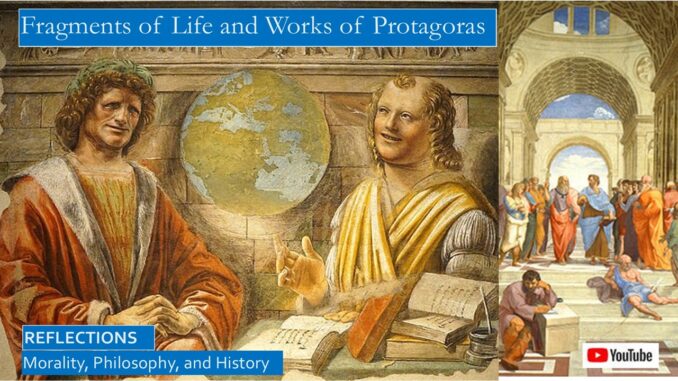
What can we learn from what little we know of the life of the Sophist Protagoras, who was featured in several Platonic dialogues, and the few fragments of his sayings that survive?
What does Protagoras mean when he says that man is the measure of all things? Does this only refer to perceptions, or does he mean that man can measure his own moral principles?
Did the teachings of the Sophists corrupt the youth of Athens?
Why did the many Athenian jurors trying Socrates believe he was a Sophist?
Why did Aristophanes accuse Socrates of being a sophist?
YouTube Script with more Book Links:
https://www.slideshare.net/BruceStrom1/the-sophist-protagoras-in-platos-dialogues-his-biography-and-fragments-of-his-works
YouTube video for this blog: https://youtu.be/fbGAV9ky8-Q
PROTAGORAS AND THE SOPHISTS
The Sophists were itinerant professors who travelled from city to city. They were not primarily concerned about determining the objective truth, they cared about teaching the art and control of life. Although they did teach grammar, poetry, and philosophy, they were primarily interested in teaching rhetoric, a skill that was essential for political life in addressing the Assembly. They also taught practical lessons on winning lawsuits, as Aristophanes notes in his play, The Clouds.
Socrates, Aristophanes and The Clouds, Capitol Riots, Georgia, and the Big Lie
http://www.seekingvirtueandwisdom.com/aristophanes-socrates-georgia-and-the-capital-riots/
https://youtu.be/Pn7wYntimjo
The older Sophists were respected, often they were selected to be ambassadors for their cities, since they frequently travelled. But in time, their perceived moral relativism hurt their reputation. But Copleston also notes, on the plus side, that Sophists were willing to draw from multiple traditions, and often their borrowings were more practical than systematic.[1] In particular, Protagoras was friends with Pericles of Athens, though Diogenes says he escaped from the city when he was indicted for blasphemy because of his book on the gods. Diogenes of Laertius says there are several stories on how he died. Protagoras may have drowned on the way to Sicily, or he may have died in old age, as Plato suggests.
Why was Plato so hostile towards the Sophists? During the Trial and Execution of Socrates, many jurors thought he was one of the hated Sophists who many thought were corrupting the youth with their teachings. The formal charges brought up against him were that he was showing impiety towards the gods, and that he was corrupting the youth. During his trial, Socrates defended himself against the notion that he was a Sophist, and he mentioned how this slander was spread by the comic Aristophanes in his play mocking Socrates, The Clouds, many years before. So, Plato is really defensive about how Socrates, who teaches for free, is not a Sophist, who often charged their students handsome sums.
Pondering the Death of Socrates in Xenophon, Plato, and Aristophanes
http://www.seekingvirtueandwisdom.com/pondering-the-death-of-socrates-in-xenophon-plato-and-aristophanes/
https://youtu.be/Mip1vgRKH1E
Why was Socrates being tried by the citizens of Athens? In ancient Athens, there were no prosecutors, anyone could bring charges, and a jury of 501 citizens would hear the case and decide the punishment, always in the same day. Athens had recently lost the Peloponnesian Wars against Sparta, and had thus lost her empire, and many partially blamed Socrates because several of his students were implicated in this defeat.
Ordinary Life and Justice in Ancient Athens, Rome, and Israel
http://www.seekingvirtueandwisdom.com/ordinary-life-and-justice-in-the-ancient-world/
https://youtu.be/vl8KGL5Yx2w
One leading character on all sides of the Peloponnesian Wars was Alcibiades. He could have been the Napoleon of Athens, but his enemies managed to derail his career each time he was on the cusp of winning major victories for Athens. Had he led the forces of Athens after Pericles, today we might be studying the history of the world-wide Athenian Empire rather than the Roman Empire.
Summary of the Peloponnesian Wars Between Athens and Sparta
https://seekingvirtueandwisdom.com/summary-of-the-peloponnesian-wars-between-athens-and-sparta/
https://youtu.be/SW9Zq4IiLF0
However, the Greek legends and myths always warn against the dangers of hubris, but Alcibiades was not merely guilty of hubris, he was guilty of outrageous hubris. After he was exiled from Athens, he advised the kings of Sparta. But then he seduced the Spartan queen and she bore him a child, which meant hubris led to his exile from Sparta. Alcibiades played a leading role in all sides of the Peloponnesian Wars, and in the Platonic dialogues he crashed the Symposium Party right after Socrates had delivered his speech. Several Platonic dialogues discuss the friendship of Socrates and Alcibiades, including the Symposium and the dialogue Alcibiades.
After the Spartans won the war, they forced Athens to set up a Tyranny of thirty aristocrats. The leader was Critias, another former student of Socrates. These were no benign tyrants, very quickly Critias and his associates started a rule of terror similar to the French Revolution, where they executed first their opponents, and then they started executing their fellow aristocrats so they could seize their property.
How did the comedy, The Clouds, damage Socrates’ reputation? Socrates is ridiculed in his first entrance in the comedy where, suspended in a basket, he is gazing up through the clouds. Aristophanes’ Socrates only cares about teaching useless knowledge such as how far fleas jumped and out of which end gnats buzzed and gazing at and pondering the moon.
Socrates, Aristophanes and The Clouds, Capitol Riots, Georgia, and the Big Lie
http://www.seekingvirtueandwisdom.com/aristophanes-socrates-georgia-and-the-capital-riots/
https://youtu.be/Pn7wYntimjo
Many of the Sophists concentrated on teaching rhetoric, which is the manipulative techniques of public speaking with little emphasis on moral principles, just like debating clubs today debate positions selected at random by the participants. The Sophist Socrates in the play instructs his students how to mislead and manipulate their peers, and how to avoid their debts. This Socrates is not concerned with justice.
Which is why Socrates has to defend himself against this slanderous portrayal by Aristophanes. This history explains why Plato was not only so adamant in demonstrating that Socrates was not a Sophist, but he also was also eager to show that it was the Sophists who were corrupting the youth of Athens, and not Socrates.
LIFE OF PROTAGORAS, ITINERANT SOPHIST
Protagoras was born in 481 BC in Abdera in Thrace, near Macedonia, and came to Athens in the middle of the century. He was favored by Pericles and was in Athens at the beginning of the Peloponnesian Wars in 431 BC. He also witnessed the plague that killed two of Pericles’ sons, and also many Athenians, including Pericles himself. But Diogenes does not provide any details.
Diogenes describes Protagoras as “the first to charge a fee of a hundred minas,” which scholars estimate is a hundred times the daily wage of a skilled worker, “the first to distinguish the parts of time,” perhaps he is referring to verb tenses, “to stress the importance of the opportune moment, and to furnish disputants with rhetorical gambits. In argument he neglected meaning in favor of verbal jousting, giving rise to today’s shallow debaters.” “He was also the first to use the Socratic form of argument.”
Was Democritus the teacher of Protagoras? Diogenes says he was, but the footnote says this was not possible, as Democritus was a generation younger. Although the Protagoras entry in Dr Wikipedia sides with Diogenes, his entry for Democritus says he was born thirty years after Protagoras. Also, though Plato does not mention Democritus, Aristotle mentions him frequently.
Although Democritus was also born in Abdera, he was not a travelling Sophist. Rather, he was a naturalist philosopher, he is best known for naming atoms as moving about the universe in a vortex, generating all composite things: fire, water, air and earth. They are not quite the same as the building blocks of matter as described by John Dalton in the nineteenth century. Dalton had borrowed the word, atom, from Democritus, not the concept.
SURVIVING FRAGMENTS OF PROTAGORAS’ WORKS
Fewer than a dozen fragments survive of the works of Protagoras that Diogenes lists. We have the same problem with his famous quotes as we do with all the pre-Socratic philosophers, scholars are forced to guess what they mean.
Diogenes of Laertius says in his short biography that “Protagoras was the first to say that there are two sides to every question, opposed to each other,” and “that the soul is nothing apart from the senses.”
Protagoras begins one of his works with “Man is the measure of all things, of things that are, that they are, and of things that are not, that they are not.”
The ancient author Sextus Empiricus also quotes this fragment, continuing the quote from Protagoras: “And for this reason he posits only what appears to the individual, thus introducing relativity.” “What Protagoras states then is this–that matter is in flux,” “and the senses are transformed and altered according to the times of life and to all other conditions of the bodies.”
Direct Quotation of Sextus: “Protagoras says also that the reasons (logoi) of all the appearances are present in matter, so that matter, so far as depends on itself, is capable of being all those things which appear to all. And men, he says, apprehend different things at different times owing to their differing dispositions; for he who is in a natural state apprehends those things present in matter which are able to appear to those in a natural state, and those who are in a non-natural state the things which can appear to those in a non- natural state. Moreover, precisely the same account applies to variations due to age, and to the sleeping or waking state, and to each several kind of condition.”
Summarizing this quotation by Sextus: “Protagoras says also that the reasons (logoi) of all the appearances are present in matter, so that matter, so far as depends on itself, is capable of being all those things which appear to all. And men, he says, apprehend different things at different times owing to their differing dispositions;” whether in a natural or un-natural state. “Moreover, precisely the same account applies to variations due to age, and to the sleeping or waking state, and to each several kinds of conditions.”
We really do not know exactly what he means by natural or non-natural states. Although most of us agree that morals should not be relative, certainly our perceptions are relative to our own experiences and our abilities to perceive.
Sextus continues quoting Protagoras, “Thus, according to him, man becomes the criterion of real existences; for all things that appear to men also exist, and things that appear to no man have no existence either.”
Copleston discusses the debates between scholars about what he means when he says man is the measure of all things. This debate can never be resolved, as that first sentence is all that has survived of this work. Does he mean the individual man, or the human race? In other words, who determines the truth, the individual, or the culture? What does he mean by things? Do things refer to what our senses perceive? Do things refer to ethical values and judgements? Plato discusses this in his dialogue Theaetetus when he argues that knowledge is not sense-perception.
The Athenians, according to Diogenes, expelled Protagoras from Athens for declaring: “As for the gods, I cannot know either that they exist or that they do not exist; for many things hinder knowledge, including uncertainty and the brevity of human life.”
Diogenes suggests that Protagoras is a bit greedy for fees. When he “asked his student Euathlus for his fee, he said, ‘But I haven’t won a case yet.’ Protagoras replied, ‘That doesn’t matter. For if I win this case, I should get the fee for winning it’ and if you win it, I should get the fee because you did.’”
Plato, in his dialogues, says that Protagoras is a relativist. When you teach young ambitious rulers rhetoric and debate skills, their political ambition often leads them to reject truth and justice. “There are ethical tendencies in all men, but these can only develop in the organized community. Therefore, he must absorb the whole social tradition of his community. This social tradition is not absolute truth, but it is the norm for a good citizen.”
Aristotle has a passing reference to Protagoras in his essay on Rhetoric. He gives an example of what his student might argue for someone who is accused of a violent assault. If the accused is not tall and imposing, they could argue to the jury that his small stature means that it is unlikely he committed the crime. But if the accused is a large and imposing man, they still argue that he was not likely to commit the crime. He says this is what Protagoras means by “making the worser argument appear the better.” Aristotle continues, “Hence people were right in objecting to the training Protagoras undertook to give them. It was a fraud; the probability it handled was not genuine but spurious.”[2]
The main sources for the philosophy of Protagoras is the early Platonic dialogue directed at him, and also the dialogue Theaetetus, a later dialogue on epistemology, or knowledge.
Platonic Dialogue: Protagoras and Socrates Debate: Can Virtue Be Taught?
https://seekingvirtueandwisdom.com/platonic-dialogue-protagoras-and-socrates-debate-can-virtue-be-taught/
https://youtu.be/dK5lgoPGKXc
DISCUSSING THE SOURCES
The primary source for the life and sayings of Protagoras is the Lives of the Eminent Philosophers by the ancient biographer, Diogenes of Laertius. He is also the primary source of the writings of the Greek Stoic and Cynic philosophers, many pre-Socratic philosophers such as Heraclitus, and a major source for the writings of Epicurus.
Heraclitus, Pre-Socratic Philosopher, Inspiration for Stoics and Clement of Alexandria
https://seekingvirtueandwisdom.com/heraclitus-pre-socratic-philosopher-inspiration-for-stoics-and-clement-of-alexandria/
https://youtu.be/7Kpfm0O8XBA
Was Epicurus Really a Stoic-Lite Philosopher? Were all Epicureans hedonists?
http://www.seekingvirtueandwisdom.com/was-epicurus-really-a-stoic-lite-philosopher-were-all-epicureans-hedonists/
Epicurus, Aristippus, and Lucretius: History of Epicurean Philosophy
http://www.seekingvirtueandwisdom.com/epicurus-aristippus-and-lucretius-history-of-epicurean-philosophy/
Epicurus, Aristippus, and Lucretius: Were the Epicureans Stoic-Lite Philosophers?
https://youtu.be/49Qv3Be86Jw
Zeno: First Greek Stoic Philosopher
http://www.seekingvirtueandwisdom.com/diogenese-on-the-greek-stoic-zeno-of-citium/
https://youtu.be/STxpGlkFyvs
Greek Cynic Philosophers
http://www.seekingvirtueandwisdom.com/diogenes-and-the-greek-cynic-philosophers/
https://youtu.be/zAAal5p8AX8
Frederick Copleston, an influential Jesuit professor, has excellent summaries of the pre-Socratic philosophies, though out of necessity his primary source is also Diogenes. He also discusses the then-current scholarly consensus on various topics relating to the Protagoras and the Sophists.
The Wikipedia page for Protagoras directed us to a collection of surviving fragments and references to Protagoras.
[1] Frederick Copleston, A History of Philosophy, Greece and Rome (New York: Image, Doubleday Books, 1962, 1993), The Sophists, pp. 81-85.
[2] Frederick Copleston, Greece and Rome, The Sophists, pp. 87-92 and Diogenes of Laertius, Lives of Eminent Philosophers, translated by Pamela Mensch (New York: Oxford University Press, 2018), Protagoras, Book 9, Chapters 50-56, pp. 460-463 and fragments from Sextus Empiricus, Outlines of Pyrrhonism, and Aristotle, Rhetoric: https://www.gpullman.com/8170/protagoras.php and https://en.wikipedia.org/wiki/John_Dalton

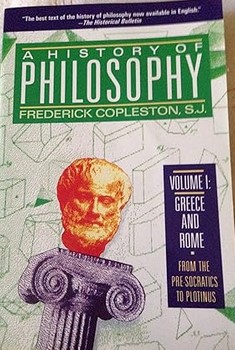
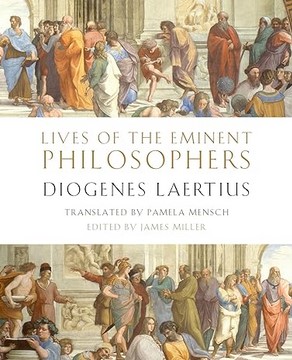
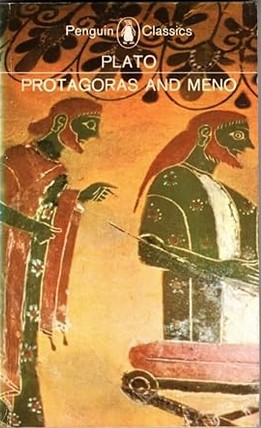

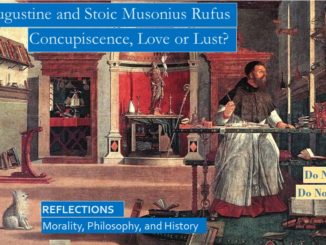
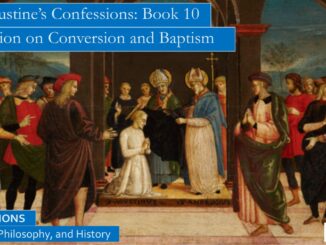
1 Trackback / Pingback